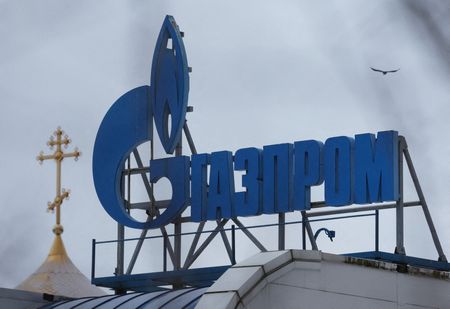(Reuters) -Russian companies’ plans to tap China’s vast bond market for low-cost funding are proving to be a non-starter as Chinese banks and investors steer clear of them on concerns about Western sanctions, sources said.
The conundrum shows the challenges Russian companies face to raise capital even in a country that has stood by it as an ally after Moscow’s invasion of Ukraine more than three years ago.
It is also a test for Beijing which has forged a so-called no-limits partnership with Russia at the same time as it is seeking to reach a trade deal with Washington.
Top Russian companies, including state nuclear corporation Rosatom and giant gas concern Gazprom, are exploring sales of yuan-denominated “panda” bonds, Reuters reported last month, citing company sources.
The news came just after Russian President Vladimir Putin visited China in early September. Russian companies have been cut off from the West’s capital markets since the Ukraine invasion.
Chinese bankers and investors, however, brushed aside the near-term prospect of any panda bond issuance by Russian firms, and a person with direct knowledge of the matter said that regulators and banks were wary of secondary sanctions risks.
“Preparation has always been underway, but you just cannot push the project forward,” said the person, citing a lack of progress over the past year in the panda bond issuance push by Rosatom and Russian aluminium producer Rusal.
Rusal declined to comment. Rosatom, which is not under U.S. sanctions, although its top management has been sanctioned, declined to comment.
Gazprom, which cannot raise financing in the U.S. or Europe but has not been hit with U.S. blocking sanctions known as SDN List, did not respond to a request for comment.
A Chinese securities exchange official said that he was not aware of any concrete issuance plans by Russian companies, and several Chinese onshore bond investors said they would be wary of buying such debt due to the geopolitical risks.
All the five sources who spoke to Reuters for this story declined to be named due to the sensitivity of the matter.
China’s state-owned brokerages such as Galaxy Securities have dropped Russia-related deals after 2022, while the “Big Four” state banks are unwilling to underwrite such bonds due to the geopolitical concerns, said the first source.
Galaxy did not respond to an emailed request for comment.
Zhan Kai, Shanghai-based partner of Yuanda China Law Offices, said there is no legal obstacle to Russian companies selling panda bonds as long as the issuer is not on the U.S. sanctions list.
“But, without doubt, local bankers and traders are worried (about acting) as underwriters or buyers,” said Zhan, who helps Chinese companies avoid sanctions and manage political risks.
“At the end of the day, whether a bond can be sold is determined by the market, and I don’t expect a lot of appetite on the ground in China” for Russian issuers, he said.
The China Securities Regulatory Commission and the People’s Bank of China did not respond to Reuters requests for comment.
CHEAPER YUAN BORROWING
In the first seven months of this year, 35 offshore firms raised 116 billion yuan ($16.3 billion) via panda bonds, after the volume hit 194.8 billion last year, the highest level since such data started becoming available in 2015, according to an S&P Global report.
No Russian companies, however, have issued debt in China’s 342 billion yuan panda bond market since the 2022 Ukraine conflict. Even before Russia sent troops to Ukraine, only one Russian firm, Rusal, sold panda bonds in China in 2017.
Hopes of issuances by the Russian firms were triggered by Chinese ratings agency CSCI Pengyuan assigning to Gazprom in early September a “triple-A” rating, indicating very low risk of default and paving the way for its yuan bond issuance.
Russian rouble borrowing rates are quite high – around 15%-16% a year – so issuing yuan bonds “is a chance to get cheap capital”, said a Moscow-based fund manager who declined to be named.
By comparison, a Chinese unit of BMW sold a panda bond in July with a coupon rate of 1.73%.
A Russian government official said that there is nothing stopping Russian companies from issuing panda bonds as long as there is demand.
“Large companies work with their placements themselves. We only help them in terms of infrastructure and some solutions,” said the official, adding the only question now is who will buy them in China, where banks are afraid of secondary sanctions.
Some Russian firms are so desperate for low-cost funding that they are looking to restructure loans with a commodities trade deal, said a manager of a Chinese state-owned company who declined to be identified.
Kirill Lysenko, an analyst at Russian rating agency Expert RA, said the process of issuing panda bonds by Russian firms could take years.
“Even within a “friendly country” framework, geopolitical risks persist. Should sanctions impact Chinese financial infrastructure, complications in debt servicing could emerge,” he said.
($1 = 7.1197 Chinese yuan renminbi)
(Reporting by Reuters Shanghai and Hong Kong newsrooms, Anastasia Lyrchikova and Oksana Kobzeva in Moscow and Rae Wee in Singapore; Editing by Sumeet Chatterjee and Muralikumar Anantharaman)








